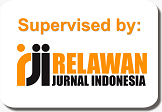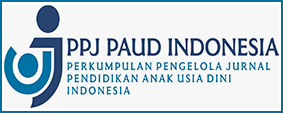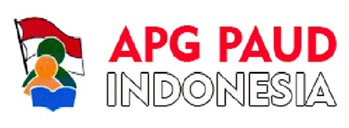The Introduction Of Chess As A Strategy To Enhance Memory Skills In Children Aged 5–6 Years
Abstract
This research was motivated by the phenomenon of children increasingly engaging in gadgets and screen-based activities, which may negatively impact their development in the future. Therefore, this study focuses on introducing chess as an effort to improve memory skills in early childhood. The aim of this research is to explore how the introduction of chess to young children can enhance their memory abilities. This study employed Classroom Action Research (CAR) conducted in two cycles, involving children aged 5–6 years as the subjects. Data collection techniques included observation, tests, interviews, and documentation, which were analyzed using a qualitative approach through data reduction, data presentation, and conclusion drawing. The results showed that children's memory abilities improved by 80.16%, categorized as Very Well Developed (BSB). These findings indicate that introducing chess is effective for use in early childhood education. The results are recommended as a reference for teachers, schools, and future researchers in developing strategies to support cognitive development in early childhood.
References
Andari, I. A. M. Y., & Meriah, E. (2023). Pelatihan Penggunaan media Loose Part Sebagai Implementasi Merdeka Belajar Pada Satuan Pendidikan Anak Usia Dini. Dharma Sevanam : Jurnal Pengabdian Masyarakat, 2(2). https://doi.org/10.53977/sjpkm.v2i2.1264
Arini, N. M., & Wiguna, I. B. A. A. (2021). Hambatan Dan Kendala Dalam Pelaksanaan Pembelajaran Daring Pasca Covid-19. Cetta: Jurnal Ilmu Pendidikan, 4(3). https://doi.org/10.37329/cetta.v4i3.1356
Atika Setiawati, F., & Suyadi. (2021). Penerapan Strategi Pembelajaran Melalui Permainan Ular Tangga Tantangan Dalam Meningkatkan Perkembangan Kognitif Pada Anak Usia Dini. Jurnal Buah Hati, 8(1), 49–61. https://doi.org/10.46244/buahhati.v8i1.1274
Bennett, D., Gobet, F., & Lane, P. (2020). Forming Concepts of Mozart and Homer Using Short-Term and Long-Term Memory: A Computational Model Based on Chunking. Proceedings for the 42nd Annual Meeting of the Cognitive Science Society: Developing a Mind: Learning in Humans, Animals, and Machines, CogSci 2020, 178–184.
Campitelli, G., Gobet, F., Burgoyne, A. P., & Groot, D. (2023). New Developments in Chess Expertise. 1–4.
Dyramoti, M., & Wahyuningsih, R. (2022). Pengaruh Aktivitas Bernyanyi Terhadap Daya Ingat, Motivasi Belajar, dan Kreativitas Anak di TK Methodist Jakarta Utara. Jurnal Paud Agapedia, 6(2), 197–208. https://doi.org/10.17509/jpa.v6i2.52012
Edita A. M. Pinangkaan, Ricky Alfredo Silaban, M. R. (2023). Ojs+Ebook+Teori+Bermain.
KARAKUŞ, G. (2023). Chess and Education. Educational Considerations, 49(2). https://doi.org/10.4148/0146-9282.2365
Kartika Sari, A., & Mia Aulina Lubis. (2023). Pelatihan Meningkatkan Daya Ingat Anak Pinggir Sungai Deli Melalui Pengembangan Minat dan Bakat. ABDISOSHUM: Jurnal Pengabdian Masyarakat Bidang Sosial Dan Humaniora, 2(1), 98–105. https://doi.org/10.55123/abdisoshum.v2i1.1526
Krivec, J., Bratko, I., & Guid, M. (2021). Identification and conceptualization of procedural chunks in chess. Cognitive Systems Research, 69, 22–40. https://doi.org/10.1016/j.cogsys.2021.05.001
Lestari, N. W. R., & Andari, I. A. M. Y. (2023). Implementasi Pendekatan Seni Kolase Dalam Menstimulasi Keterampilan Abad Ke-21 pada Anak Usia Dini. Widya Sundaram: Jurnal Pendidikan Seni Dan Budaya, 1(1), 1–13. https://doi.org/10.53977/jws.v1i1.1044
Nanu, C. C., Coman, C., Bularca, M. C., Mesesan-Schmitz, L., Gotea, M., Atudorei, I., Turcu, I., & Negrila, I. (2023). The role of chess in the development of children-parents’ perspectives. Frontiers in Psychology, 14(June), 1–12. https://doi.org/10.3389/fpsyg.2023.1210917
Pertiwi, D. A., Fitroh, S. F., & Mayangsari, D. (2018). Pengaruh Permainan Tradisional Engklek Terhadap Perkembangan Kognitif Anak Usia 5-6 Tahun. Jurnal PG-PAUD Trunojoyo : Jurnal Pendidikan Dan Pembelajaran Anak Usia Dini, 5(2), 86–100. https://doi.org/10.21107/pgpaudtrunojoyo.v5i2.4883
Pratiwi, A. F. (2017). Peningkatan Daya Ingat Anak Usia Dini Melalui Media Mind Mapping Pada Kelompok B Di Tk Islam Al-Muttaqin Kota Jambi. Program Studi PG-PAUD Universitas Negeri Jambi, 1–12.
Sakeer, A., & Selliah, J. (2022). Impact of Playing Chess on Cognitive Skills in Schools Under Chess Association of Ampara District, Sri Lanka. European Journal of Physical Education and Sport Science, 9(1), 44–60. https://doi.org/10.46827/ejpe.v9i1.4479
Sandi, A., & Neviyarni, N. (2021). Ingatan II : Pengorganisasian,Lupa dan Model-Model Ingatan. Edukatif : Jurnal Ilmu Pendidikan, 3(1), 115–123. https://doi.org/10.31004/edukatif.v3i1.191
Sumini, N. K., & Andari, I. A. M. Y. (2023). Gerakan Literasi Pada Anak Usia Dini Melalui Outdoor Learning Activity. Kumarottama: Jurnal Pendidikan Anak Usia Dini, 3(1). https://doi.org/10.53977/kumarottama.v3i1.925
Umam, A. Kh., Aneka, R. R., & Cahyo, E. D. (2021). Pengembangan Kognitif Anak Usia Dini Berbasis Kajian Teoretis dan Studi Empiris. 1–113.
Utami, Fitria Budi; Kasih, Delina; Utama, W. W. I. (2022). Bermain dan Permainan Anak Usia Dini (Supriyadi, Ed.). Penerbit NEM.
Wiguna, I. B. A. A., & Sunariyadi, N. S. (2021). Peran orang tua dalam penumbuhkembangan pendidikan karakter anak usia dini. WIDYALAYA: Jurnal Ilmu Pendidikan, 1(3), 328–341.
Wiguna, I., & Ekaningtyas, N. L. D. (2021). Strategi orang tua dalam mendampingi anak usia dini belajar daring di rumah. Pratama Widya: Jurnal Pendidikan Anak Usia Dini, 6(1), 86–95.
Wulandari, N. P., & Andari, I. A. M. Y. (2025). Problematika Guru Dalam Mengevaluasi Pembelajaran Seni Budaya Di Sekolah Menengah Pertama Negeri Di Kota Mataram. Widya Sundaram: Jurnal Pendidikan Seni Dan Budaya, 3(1), 25–34.

This work is licensed under a Creative Commons Attribution-ShareAlike 4.0 International License.
Authors who publish with this journal agree to the following terms:
- Authors retain copyright and grant the journal right of first publication with the work simultaneously licensed under a Creative Commons Attribution-ShareAlike 4.0 International License that allows others to share the work with an acknowledgement of the works authorship and initial publication in this journal.
- Authors are able to enter into separate, additional contractual arrangements for the non-exclusive distribution of the journals published version of the work (e.g., post it to an institutional repository or publish it in a book), with an acknowledgement of its initial publication in this journal.
- Authors are permitted and encouraged to post their work online (e.g., in institutional repositories or on their website) prior to and during the submission process, as it can lead to productive exchanges, as well as earlier and greater citation of published work (See The Effect of Open Access).











.png)








